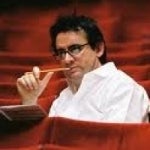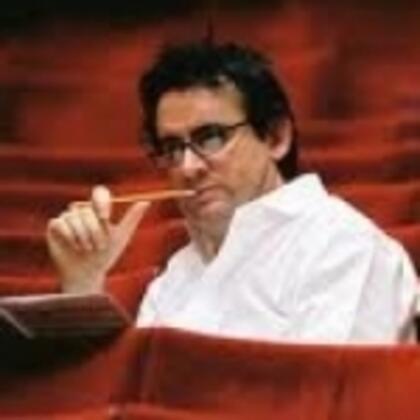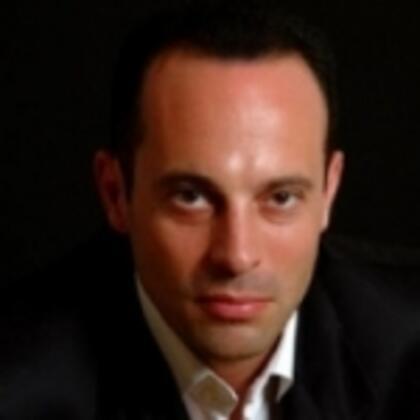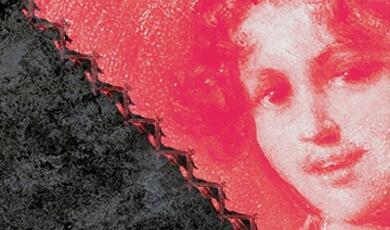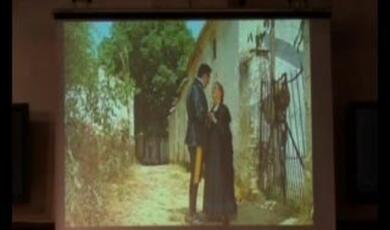7 February 2013
Darkness Audible: Benjamin Britten at 100 –
Early, 1913 - 1945
Dr Paul Kildea
Thank you for such a warm welcome on a cold night. You are probably all aware, or many of you will be aware, of the rather lovely cartoon of Beethoven sitting down in his study and saying, “Today, I will begin my Late Period.” It is a slightly arbitrary way of looking at music, but with some composers, it works better than others, and certainly, when writing this book, I had a think about how it would apply to Benjamin Britten. The book is divided into three sections - early, middle, late. “Late” deals with just the last six years or so of his life; “Early” takes us up to 1945; and the middle period goes from ’45 to ’70. So these are the framework for the three lectures in this series.
So, Benjamin Britten, 100 years old this year, if he were to be alive, born in Lowestoft. The interesting thing to say about him, first up, is that the music to begin with was not really very good. He started writing music from a very young age, streams and streams of manuscript paper which ended up in elaborate catalogues of his own devising, and then into drawers which he called his “early horrors”, which occasionally he would dip into this drawer of “early horrors” later in life to get melodic material mainly. The music, to begin with, was actually very straightforward, sort of Victorian hymnbook type stuff, and it was only when he met a rather remarkable man – this is the view from his house, which is why the sea became such an important thing in his childhood and then also throughout his life. That is part of his own sketching actually, the British fleet sighted, which is rather cute. He met a remarkable man, Frank Bridge, in 1927.
Bridge is not really very well-known today and certainly should be known much better than he is. He, by this stage, in the late-‘20s, had started dabbling in some of the modernist ideas and sounds from the Continent, which was in marked contrast to the more pastoral music of his compatriots at the time. Britten went and heard a piece of Bridge’s, called “The Sea”, which he said knocked him sideways, and just through lucky chance, his mother knew someone who knew someone, and the young boy was introduced to Bridge, and Bridge took him under his wing. It was a very concentrated apprenticeship, if you like, and Bridge had one simple rule, which is that you have to discover what it is that is in your head and then you have to be true to that and get it from your head to the paper. So, from this very simple stuff that he was writing in the mid-1920s…
[Music plays]
…suddenly, he works with Bridge, and you get immediately new influences…
[Music plays]
Many of you are probably thinking of the Ravel “Sonatine”…
[Music plays]
Of course, those of you that are great opera fans and Wagner fans will hear a lot of “Tristan and Isolde” in especially the last page of that. Suddenly, the world that Britten had been occupying, of Victorian hymnbooks, of rather pastoral songs involving bunny lambs and shepherds, had suddenly been expanded into the sounds of French modernism, or French romantic impressionism, and then also of some of the ideas of inharmony that Britten was encountering through Bridge.
He was very interested, at that stage, in poetry. Even from a young age, he had a great grasp and interest in poetry, and would read it. The two things he had read, as a small boy in Gresham’s School up in Holt were little pocket scores and anthologies of poetry. It is almost impossible to believe that he was not bullied beyond anything, but his schoolmates seemed to take this as something just rather good, and of course he got round any problems by playing very good tennis and very good cricket, so that was his cover. He was really fascinated by the idea of poetry, and also, from a very early age, the idea of anthology, of putting together different poems to come up with a story.
One of his first and most successful anthologies is a choral piece he wrote called “A Boy was Born”, which he wrote in 1933 and premiered on the day that Elgar died. It is an amazing mixture of different poems, telling a very straightforward story, which is the birth of Christ, but he started doing some things here that you would see in later of his works. The first idea here was, as I say, using different poems, and juxtaposing them to construct a narrative, and this was going to become incredibly important as an opera composer in the early-‘40s and onwards, but he also did one of the things that would characterise a lot of his later music, which is this idea of a slow reveal, that you play with ideas, you play with motivic ideas, that then gradually are fleshed out until, at the very end, you end up with the whole melody, and you suddenly think, oh, I knew somehow, I knew that melody was coming, and he was very proud of himself for this and so you see it a lot in his mature works, but the first example of this was in this rather beautiful unaccompanied choral piece, and where it really sounds as though the choir is just playing this little harmonium almost, in a small, dank church, and then the boys come in with the melody that has been hinted at along the way. So, in this case, it’s…
[Sings]
And then the boys…
[Sings]
I am not going to sing [laughing]! But it was that idea of just giving people little flashes of inspiration and then knitting it all together at the very end. It was 1933 when he started doing this.
It was at around this time, just a little bit later, 1935 in fact, that he meets the poet Wystan Auden or W.H. Auden, and Auden and Isherwood were, of course, titans of the English literary scene at the time. It was at this stage, Britten is a very repressed individual, both in terms of his sexuality but also in terms of his politics. He is a pacifist already at school, he is anti cruelty towards animals, anti-hunting, but he has not yet worked out almost a way of putting all these ideas and values together, and so of course he meets one of the great didactic people of the 1930s, W.H. Auden, who takes no time at all, bossing him around. At one point, Isherwood said this rather wonderful thing – “We viewed Ben as a project as much as a friend, and we both went to work on him,” and he said, “And what can you expect from a couple of doctors’ sons, bossy old doctors’ sons?!” So they did, and what Britten ended up coming up with is a cocktail which was rather common in the 1930s of left-leaning politics, of homosexuality, and of pacifism as well, and it was in the aegis of the GPO Film Unit and the Group Theatre, for instance, that a lot of these people came together.
Isherwood, at one point, had one of his books reviewed in about 1936/1937, and the reviewer said, “I started to think that there were quite a lot of homosexual characters in this book, but then I decided that there are a lot of homosexuals around these days.” So that’ is what we had with these, and one of the first things that Auden did with him was to work on some cabaret songs for a production of the Group Theatre company, and one of the most famous of these cabaret songs is ”The Funeral Blues”.
[Music plays]
You would know that, famously, the poem from the film “Four Weddings and a Funeral”, but of course the influences that Britten was dealing with are closer to home.
[Plays]
The opening to Mahler’s Fifth. He had just discovered Mahler. It was like a wave over him, and you have got to remember that it was not really well-known at that stage, and so he had a number of recordings and broadcasts by Bruno Volter that transformed his life, and Mahler, the sonorities, became very important to him, mostly the idea of using large canvases but then sketching very, very tiny details, and that is something he got from Mahler.
The end of the 1930s, for him, was a period of great intellectual disquiet. He found that he was such of a sensitive nature that he found criticism of any type almost impossible to bear. Now, I do not think it was very fair, the way he was so prickly about critics. A lot of the critics, even at this stage, had important things to say about his music, which, at this stage, had not yet developed a really authentic voice, if you like, the voice that was going to emerge most naturally in the 1940s.
He found as well that what he called almost a necrotic aspect of English society at this stage, and Auden of course had developed this idea, and that was very strong in their works in the late-1930s, of parable art. He said there should be decorative art and there should be parable art, and that parable art – the decorative art of course is to amuse and entertain. The parable art is to teach and humanity should learn from the great works of art. Britten took this very seriously in the late-‘30s, and of course he did not count on Auden being such a changeable beast, and so Auden leaves, at the beginning of 1939, with Isherwood, to go to America, and on the ship on the way over to America he confesses to Isherwood, he says, “Actually, I do not think that a work of art has changed human discourse or ideas in the whole of history.” That is obviously false, but Auden had stopped wanting to be a standard-bearer, if you like, for the 1930s.
He also said something interesting, that, in 1939, he had to leave England because otherwise he would become part of the Establishment, and this is the thing that he later disliked about Britten so much, that he thought that Britten was too much part of the Establishment. But, at this stage, in the late-1930s, all of this is up for grabs, and Britten and Peter Pears then follow them over to America, quite early in 1939.
America, for him, at first, was this extraordinary place. It was exciting and it was thrilling, and he got an amazing amount out of it in terms of recognition. He somehow thought that the critics were a kinder variety in America, falsely of course, and he thought that it really was a land of opportunity. There were some interesting commissions, and there were some really good and strong performances, and at this stage, Britten and the tenor, Peter Pears are only friends and they had travelled there.
What had happened to help push him on his way was that Britten had got into a relationship with a young German, the son of the conductor Hermann Scherchen, and in mid to late 1938, the year that his “Piano Concerto” was first performed at the Proms, commissioned by the BBC, Britten got back in touch with Scherchen, having had met him four years earlier. At that stage, it was Britten’s first successful relationship, or successful attempt at a relationship, and certainly Scherchen’s. Scherchen, later, was very embarrassed about the nature of their relationship and married and sired hundreds of children I think, and is a really gentle and rather interesting man, but Britten suddenly discovered that this relationship that he thought was going to sustain him did not, and so this, the critics, the idea somehow that England was this necrotic society, made him more keen than ever to follow Auden over.
I do not know how accurate Britten’s perception of America was at first. He found New York, for instance, this staggeringly busy city to live in – he was never one much for cities. He later said of London, of course, “I hate it!” you know – “London, to me, is just a place for dentists…” Not dentists to live there, but dentists to visit, and he felt the same thing about New York.
He managed to reacquaint himself with these cultured Jewish Germans, the Meyers, whom Pears had met in 1936 on board a ship, and the Meyers had very carefully, over a period of about four years, moved their children, like chess pieces, to get them out of the war that they knew was coming, and they reassembled in Long Island, and so there was this rather beautiful, middle European cultural milieu that Britten had not really encountered before.
There were a few signs along the way. In 1934, he visited Vienna for the first time, and heard the opera and the orchestras there, and it really confirmed his instincts that he had been writing about in his diary, in a bad-tempered way, since the age of about twelve, that the music as it was performed in England, before the War, was actually rather rotten. He despaired at the type of conducting that went on, which, do not forget, at this stage, particularly in the Proms, is one orchestral rehearsal, followed by the concert, and that of course is why English players are such great sight readers – they had to be, they literally had to be. Britten despaired of this; he just thought this was actually really crummy stuff, and in 1934, in Vienna, he confirmed this. He just listened to it and he just went, okay, and that was a real red-letter day because, from there on, he decided that he was not going to put up with what was understood to be acceptable performance practice in England at the time, and that he was going to strive to make it so much better. This had huge implications after the War because he then thought that he had to be the architect and builder actually of these organisations that would help do music at a much higher standard.
But in 1939/1940, in America, he is suddenly immersed into this very German model of culture, if you like, these very cultured émigrés, to do with literature, interested in poems, they speak six languages, they all play instruments – it was very much this idea of haus musique that was commonplace, on the Continent then. This was also something that Britten found really mesmerising and sought to replicate after the War. You will see, many times, photographs of him in his rather lovely house on the seafront in Aldeburgh, with people just playing chamber music, and often Britten on his third or fourth instrument, playing the recorder, giggling, with tears coming down his eyes as he plays this little “toot-toot-toot” thing, but he loved this idea, and the Meyers helped him sort of reinforce that.
Of course, there was one moment where, for about eight months or so, he lived in Brooklyn, in this big old brownstone, with people like Gypsy Rose Lee, who was just writing “The G-String Murders”, which was about to be published and then made into a very successful film, and it was a circus house. You even had, at some point, Salvador Dali coming and staying, you had Paul and Jane Bowles – it was way too much for Britten, who was actually a very conservative character and did not like coming downstairs and finding one of the flatmates naked playing at the piano, or Carson McCullers, the author, sitting in a corner writing, with a cup of gin. This was just way too outrageous for him, and so of course, for the last year of his life in America, he finds himself living back with the Meyers, which had always sort of supported him more and appealed more to his rather conservative personality.
The homesickness in America that he suffered was severe, and there was also, of course, a lot of criticism of Auden, Isherwood and Britten, and a few other people, of Englishmen abroad when they should be back home participating in the War instead of criticising it from afar. Some of this was fair, but some of it was unfair, and Isherwood, early in the War, wrote the thing that I really resent and is the hatred of spinsters and scout masters and school teachers – it was this idea of people whispering, and the idea as well, do not forget, that was still prevalent in the Second World War, or the memory was still prevalent, of the white feathers being thrust into the arms of conscientious objectors.
But Britten started experimenting with what it was going to be English, when he started thinking about coming home and facing up to what was going to be, at that stage, not necessarily a very straightforward conscientious objectors’ tribunal, and the idea that he came up with was to start setting, first, English folk songs, and then the folk songs of an ally, France, and it was at this point that he really engaged with the idea of Englishness in a Continental milieu and this first book of folk songs, published in the early 1940s, shows – this one is actually a Welsh tune, but it actually shows him engaging with a type of harmony and dissonance that was going to characterise a lot of his large scale work in the late 1940s.
[Music plays]
Some of those notes were not Britten’s. I will just add, when you are thinking, my, that is getting very modern, is it not?
Funnily enough, at the end of Britten’s relationship with Auden, he did effect an extraordinary change, not just in the type of poetry that Britten was interested in and started reading, but also in the way he thought about how that poetry fitted into the world. They decided to work on a rather ambitious operetta. They called it a choral operetta, and it was this idea, the whole of the time that he was in America, just as he was working on these folk songs and starting to think about where he belonged as a composer, he started to think about perhaps wanting to write opera perhaps.
You have got to remember that this is an incredibly ambitious idea for an Englishman at this stage. Covent Garden as we know it only really emerged from 1945, in Maynard Keynes’ determination that England would have a house worthy of the country that it had just vanquished in the War, so a match for Berlin or Vienna or for Dresden. So, the operatic landscape in England before the War is actually pretty sketchy. You have Sadler’s Wells in the mid to late 1930s starting to tour, and of course, in the Wartime, it was touring with orchestras of five strings and a trombone or something like this, in arrangements which you can only imagine. But, at this stage, for Britten to be thinking of himself as an opera composer, or potentially as an opera composer, is a remarkable idea, but at least in America, there was more outlet for this, and of course the Metropolitan Opera – not the building that you know today but the old Met was there. Their sights at this stage were on Hollywood and on Broadway, and so, for Broadway, they decided to write a folkloric adaptation of Americans’ origins, and they decided to pick the story “Paul Bunyan”.
When asked by a sceptical American reporter what it is that these two very proper, very pucker Englishmen were doing writing and telling the Americans about their own origins, Britten said something rather nice, which is “Every now and then, a stranger sees things more clearly.” No one really agreed after the event that the strangers did actually, and “Paul Bunyan” ended up being something of a fiasco. I am not surprised, on some levels.
Other than that, he jumped on the bandwagon with Auden, and Auden had, by this stage, learned how to do parody and pastiche by the hatful, and Britten decided to match him as far as he could. I always think that, with the Britten and Auden relationship, that Auden would write a poem at breakfast time and Britten would see it as a challenge to set it as a song by lunch. That is often what happens, and often it sounds like that as well, that these pieces are written rather quickly. He had been amazed, for instance, that “The Funeral Blues” is still performed today. He had been completely shocked by that. It was written as a jobbing composer writing for the theatre. It was actually those pieces that got him some popularity in America at the time, and so he thought they would do the same thing with this opera on “Paul Bunyan”.
As I say, there is a rather lovely song where Johnny Inkslinger is thinking about what on earth he is doing. He is a bookkeeper who finds himself in the company of these lumberjacks, and he starts to think about the new country that they are trying to build, these lumberjacks, but also what is he doing, what does he have in common with them. So, as I say, this is the only real piece of “Paul Bunyan” that has Britten’s genuine voice to be heard.
[Music plays]
The failure of “Bunyan” did it for the relationship between Auden and Britten. Auden never really helped himself in this matter by sending him, just before they left for England, a very firm letter, and it is a very famous letter, where he accused Britten of always looking for a cosy nest and people around him who will cuddle him and nurture him, and he said this rather lovely line at the end, where he said, “You have got to learn – if you are really going to thrive as an artist, and if you are really going to thrive as a human being, you are going to have to learn how to be a shit.” Britten said, “Ay yes, that is just Wystan again,” but it really did start as though the fiasco of “Bunyan”, this didactic relationship, the increasing relationship now with Pears, and also that he had learnt sometimes just friendships just last a certain amount of time, and he had learnt so much from Auden in this period, not least of all about the English language.
One of his other discoveries at around the same time as he started writing these folk song settings was the music of Purcell. Auden himself wrote rather beautifully about Purcell and Buxtehude. He wrote a great poem called the “New Year Letter” in 1940, where is said: “The very morning that the War took action on the Polish floor, lit up America, and on a cottage in Long Island shone, where Buxtehude as we played one of his passacaglias made our minds a civitas of sound where nothing but assent was found, for art had set in order sense and feeling and intelligence, and from its ideal order grew our local understanding too.” So, that pictures this idea of these Englishmen in this cottage on Long Island playing Buxtehude on the piano in duet form. That was going to be a really important part of Britten’s musical armoury, if you like, because it was with the Buxtehude passacaglias that his whole palette would start to change. So, if Purcell gave him a different way of setting words, which became increasingly important as his relationship with Auden deteriorated, and in Purcell, he liked the freedom and the daring and the darkness with which Purcell set the English language, despairing at how composers had set it in, the hundreds and hundreds of years since, but in Buxtehude, he found this idea of the passacaglia, which is just sort of a repeated bass line, over which melody can change and shift, but you are left then with this idea of time passing before your very eyes. That is how I always think of with passacaglias.
One of the most amazing examples of how this affected his work was to be found in these sonnets of Michelangelo, the “Seven Sonnets of Michelangelo”, that he set as a gift to Peter Pears, and these were free-wheeling love songs and Britten in the 1930s, late 1930s and early ‘40s, before he really discovered the beauty of English poetry as set by Purcell, had used foreign languages in some of his works as a disguise almost. The disguise is very evident in this, which is, after all, an extraordinary love song to Peter Pears, but have a listen to how he uses the bass line and the example that he had got from the Buxtehude that he had been playing with such relish on Long Island.
[Music plays]
I will just read the poem…
“Noble spirit, in whom is reflected,
And in whose beautiful limbs, honest and dear, one can see
All that nature and heaven can achieve within us,
Excelling any other work of beauty;
Graceful spirit, within whom one hopes and believes
Dwell – as they outwardly appear in your face –
Love, pity, mercy, things so rare
And never found in beauty so truly;
Love takes me captive and beauty binds me;
Pity and mercy with sweet glances
Fill my heart with strong hope.
What law or power in the world,
What cruelty of this time or a time to come,
Could keep Death from sparing such a lovely face?”
The disguise was important back in England in 1942, and in his appeal to the conscientious objectors’ tribunal, the first time round, he gives the impression, a rather woolly impression, and so they have to go in with a rather more hard-hitting appeal, and it is a rather beautiful document, a statement that Britten has to make: “Since I believe that there is in everyone the spirit of God, I cannot destroy and feel it my duty to avoid helping to destroy, as far as I am able, human life, however strongly I may disapprove of the individual’s actions or thoughts. The whole of my life has been devoted to acts of creation, being by profession a composer, and I cannot take part in acts of destruction. Moreover, I feel that the fascist attitude to life can only be overcome by passive resistance.”
Funnily enough, they did allow him a full exemption from military service. Britten, at that stage, thought perhaps he would end up like his great friend Michael Tippett, in jail for a period of time or working on munitions or something like this, but actually, they allowed him to get on with his life, and more or less unobstructed.
The interesting thing that came out of this was that Britten and Pears started doing recitals up and down the country. Pears had left England in 1939, with not a particularly impressive instrument, but had worked with this very tough Australian singing teacher in New York, and the voice had been transformed and it was actually a much more powerful instrument. So, between the two of them, they started doing concerts on behalf of the Council for the Encouragement of Music and the Arts and going up and down the country in blacked-out trains, returning to the capital in the evening after a recital, and it wass this experience that actually turned Britten into one of the great post-War song accompanists, and Pears as well, one of the really distinguished post-War [leading] singers.
They found being back in England a troubling experience, and it was mainly because of what they encountered there. This is the privations of the Blitz, which was more or less over, certainly, by the time they returned there in 1942, but there obviously were still bombings taking place in London and still would until the early months of 1945, the last year of the War. They found a toughness, a real gritty roughness to the English and a real downbeaten grit in the people and the circumstances that they encountered. Britten’s way of dealing with this was to escape to the mill he had bought in Suffolk before the War and had renovated and work on the piece that was going to effect his transformation, if you like, or rehabilitation, in the eyes of the British.
He had a few strikes against him: he was a conscientious objector – admittedly, he had been given complete exemption from military service; he was a pacifist – that goes without saying; and he was a homosexual. His way of dealing with this, because he had an incredibly high standard, almost moral standard for himself, was to act with utmost propriety and that is the way he dressed, the way he spoke, the cars he drove, and this was almost his way of disguising the fact that his relationship, or at least the sexual act of his relationship, was illegal and would remain so until 1967.
He was able to work on a commission that the great conductor Serge Koussevitzky had made just before he left for England. He had, famously, in 1941, visited California, which he hated, he just hated with a vengeance – he just said all these fat pampered children and this awful food and the bad driving and the Spanish villas and pagodas – none of that for me, thank you. He was incredibly proper and did not like the more free-wheeling aspects of American society as he encountered it. But Koussevitzky had done some of his music and was a great admirer of his orchestral palette at that stage, and the orchestral palette was very impressive. Post-War, he had found himself obeying Frank Bridges’ dictum and trying to pare down the music and be more truthful to a much more intimate sound that was in his head. But in 1940 and 1941, he was experimenting with a much broader palette and much larger scores, if you like. Koussevitzky had said, “How is it possible that a man that can drive his way around an orchestra like this, how is it possible that you have not written an opera?” and he responded by saying, just to have the time to do that, to have the money, to have the financial freedom, to prepare a thousand pages of orchestral score, I just do not have that, and so Koussevitzky said, okay, I will commission you, and threw a thousand dollars his way, which was not actually that much, about £250 then, and anyway, it was enough for Britten to say, okay, I will go ahead with this. Koussevitzky, after, later was asked, “How much did you pay?” and he said what he paid, but then he added, not terribly helpfully, “Well, if he had asked for more, we would have given him more!” So, instead, you have Britten having to eke out more of an existence back in England doing these tours on behalf of the Council of Encouragement of Music and the Arts.
So, this was Britten’s way of escaping it, escaping the War and pretending that he did not have to engage with this in any significant way. It is, I think, telling about his personality that he much preferred the idea of isolation in Suffolk, working away on his own scores and his own music, than the rough and tumble that accompanied London life during the War. He was never interested in the Fitzrovia set or of the conversations that happened between writers in their cups – that was just too confronting for him. Also, it has to be said that he got his stimulation after Auden, he got his stimulation more from poetry and from his reading than he did from conversations with other people, which is perhaps consistent with his personality, but surprising in a composer who has to spend so much of his or her time in isolation and you would think that they would look elsewhere for some external stimulation – not the case with Britten.
But when it came to working on this opera, it was based on the poetry that he had read about in the “Listener”, the poetry of George Crabbe, and he had read this article in 1941 by E. M. Forster. Forster talked about Crabbe as a realist poet, as opposed to romantic, that whereas a lot of Crabbe’s contemporaries were interested in pastoral imagery or shepherds, Crabbe was interested in the almshouses and the deaths and all the grit of Aldeburgh in the early 19th Century and late 18th Century. This of course appealed to Britten. It was significant that these poems, the Crabbe poems that he read and tracked down in a bookshop in California, there is about twenty poems and there is no overarching narrative – they are quite episodic.
It is quite telling that Britten, after the fiasco of “Paul Bunyan” nonetheless saw some operatic potential in them, and what he had to do was what Auden would later do for Stravinsky, working from the Hogarth etchings to put together a libretto for “The Rake’s Progress”. Britten almost had to take these little characters, little snippets, little incidents, and weave them into an overarching narrative, which he did with great skill, aided to a huge degree by Montagu Slater, who did not last the distance, alas, because he was too confronting for Britten, but he was an extraordinary person.
What he did of course was that they wrote the opera “Peter Grimes”. Grimes – at this stage, Pears of course was working for Sadler’s Wells and so Sadler’s Wells looked like being the house for it, but it was an incredibly ambitious project for a company that, at that stage, was touring “Traviata” and touring “Magic Flute” and the like with small orchestras, and here it was, Britten writing a new discordant piece for this company, which of course was received with the predictable open-heartedness of singers the world over!
But you can see, in just one scene in here, in the very famous aria that he wrote for Peter Pears, which was looking at the rather beautiful part of Pears’ voice, you can see all the ideas that he had accumulated from Purcell, from Buxtehude, and gives the crazy fisherman, Peter Grimes, this very still moment when he comes rushing into the pub, the Great Boar, and, in the middle of a storm, and silences everyone with this sort of visionary idea of what he had seen in his mind or outside.
[Music plays]
It is almost impossible to overstate the effect that “Peter Grimes” in June 1945, had on Britten’s career, on the idea of English opera, and on the prospects, if you like, for a new company at that stage at Covent Garden. It was the thing that changed him. It effectively completely his rehabilitation as a composer, and to find out more about that, I would invite you to come back next week.
© Dr Paul Kildea 2013


 Login
Login
